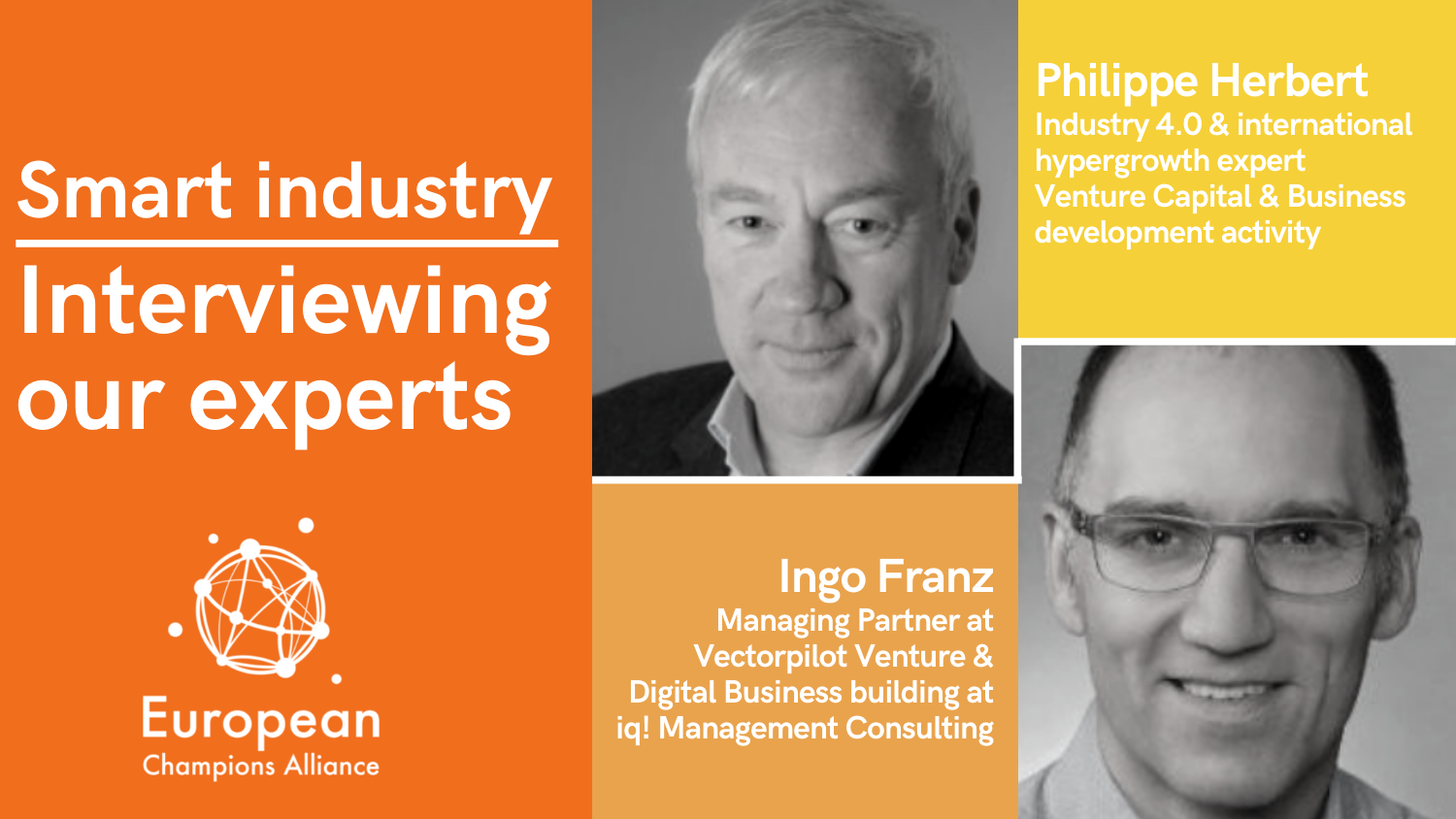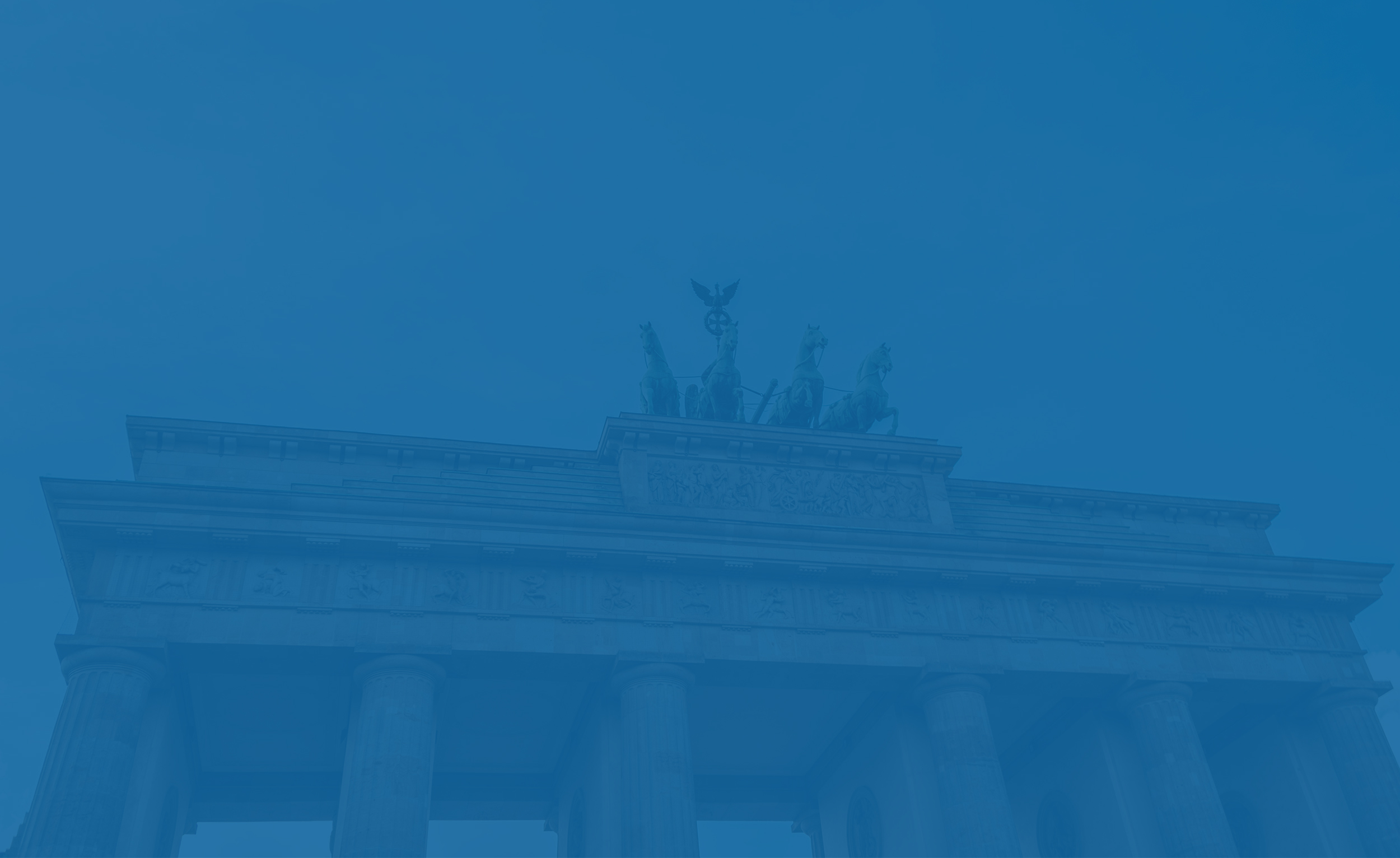
26 May Interview: our smart industry leaders
“I had the privilege to interview the two ECA Smart Industry focus group leaders, Ingo Franz and Philippe Herbert. We discussed issues surrounding the Smart Industry topic, the European ecosystem’s specificity, sovereignty on a global scope.”
Emma Neige – Strategic Partnerships and communication for ECA
How do you see the Smart Industry evolving in the near future?
Ingo Franz
If we talk about the “near future”, the priority for most industrial companies is currently to rebound their business after the pandemics. For the adoption of “Smart industry” I think the pandemic has shown the need for digitization in general, in a good way.
Philippe Herbert
…. It has been a big push for Smart Industry, but the crisis has also demonstrated the dependencies and that we need to be more active on the European level.
Ingo Franz
But talking about the future “Smart Industry”, we should not talk of an evolution of the status-quo. “Smart Industry” or “Industry 4.0” is rather a paradigm shift: How will the industry be working as a digital and connected ecosystem? For me it’s a step change to embrace the potential of new digital technologies. The impact is in all industrial segments, sooner or later. When Companies are responding with evolutionary, continuous improvement approaches they will face fundamental risks. It’s also a global challenge for Europe’s industry.
Philippe Herbert
…. and it’s plenty of opportunities and challenges. You have to compete on the product-side, creating a connected & smarter offering, combine your products with digital services in order to remain relevant inside the digital supply chain. This comes on top of the overall challenge to digitize your processes, automate manufacturing and make use of state of the art IT to create cost efficient and competitive structures.
Ingo Franz
indeed, since 10+ years we are actually in a constant digital transformation. We see that companies cope quite well when digitizing their core processes in design or manufacturing. We observe that the challenges start often when traditional companies have to cope with the new digital reality in customer & market interfaces, deriving revenue from the vast amount of data that their new “connected” products provide, or when shifting their traditional hardware-based business to subscription-based models. Maybe, it’s where the real disruption starts.
Philippe Herbert
… and competition grows. We see that companies like Google or Amazon move with their cloud-centric IT more and more into the industrial and operational context. Large European companies such as Bosch, Siemens or Dassault Systemes and Thales are trying to build their own ecosystems. As well, there is room for new players and an opportunity for the large number of Startups e.g. in German and French Tech that focus on Smart Industry innovations.
What are the key technologies?
Ingo Franz
To understand the current disruption and opportunity, we have to look at a combination of major tech-shifts. For me, the game changer is the data disruption. The Internet of things has connected products and operational technologies, Data technologies and cloud computing provide unprecedented processing power … that opens the door to apply artificial intelligence. In combination, it’s an enabler to define disruptive products or real predictive maintenance or automate autonomous systems.
Philippe Herbert
Another disruption is coming from AR and VR technologies that change design, workflow management and human interaction in general. It’s a good example of a Technology that has been around for a long time, but as digital capabilities and infrastructure opens the doors for a broader adoption. A good show case for Smart Industry that saves time, cost and resources e.g. by simulating products and processes or by managing processes remotely.
Ingo Franz
Generally, excellence in Software is becoming the key factor for industrial players. Frontrunning Companies innovate today with software-defined hardware products or manufacturing equipment. Here, winning and managing talent seems to be an issue!
Philippe Herbert
So it’s a combination of technologies and human capabilities. There are changes in operational technologies that take long to a broader adoption but finally when user interfaces and workflow’s are adopted, then they make a real difference. Just take the advance of robotics and cobots outside the typical high-volume production environments, or the growing adoption of additive manufacturing.
Is there a difference in Europe compared to other countries?
Ingo Franz
In Europe we have a strong historic industrial base and an ecosystem e.g in the Automotive industries, strong supplier base and excellence in research. In theory, is a great asset and ecosystem to innovate. As well, we can see i.p. in Germany and France a lively startup activity around Smart Industry that receives more and more Venture Capital funding.
Philippe Herbert
Indeed, we have all these elements but maybe outside of Europe they can think more “out of the box”. Europe has to carry this legacy that can be a weight. It is important to be more enthusiastic in terms of smart innovation and human resources interaction. The winning solution will be the one to take advantage of the new possibilities as well as the new organisational structures. The investment capacities & priorities should be more on the Smart Industry and not mostly on low tech. The more you invest in innovation the more you enable innovation. Part of the Industry in Europe is still very traditional.
Ingo Franz
… but there is a learning from the slow digital transformation in the consumer internet where many traditional market leaders have been protecting for too long their traditional business models. Finally, Europe lost many sectors to US big tech companies. In the industrial context we have in Germany and France large companies (Bosch, Thales, Siemens, Dassault Systèmes) that are capable of being frontrunning on a global base.
Philippe Herbert
In France, the industry has been through a tough time since 1990-2000, this is related to all the stakeholders not willing to invest in the concept of Smart Industry and the connection of new technologies and deeptech. This is something that is still not totally at full speed. In France, we should definitely continue to evangelise the fact that the Smart Industry is a huge potential in terms of value creation and we have all the elements to be a leader in this sector.
Ingo Franz
Germany has traditionally a different mix of industrial sectors with a strong international recognition of its “Maschinenbau” and “Mittelstand” for providing B2B products and equipment for the world market. But China is not only the largest customer but has become the key competitor. So, innovation and competitive advantage in the “Industry 4.0” field is as well imperative for the economic model in Germany.
What can you say about the collaboration between the stakeholders in the Smart Industry?
Philippe Herbert
We have many of the ingredients for developing and defending European Champions in Smart Industry. There is pressure and willingness to re-invent traditional models. What has changed in the last few years, is that large companies look more for external innovation and understand the value to work with up-coming tech companies and start-ups.
Ingo Franz
… a good example: a manager from Bosch told me that they have their own ambitious R&D pipeline but at the same time they actively engage through Start-up cooperation and with corporate venture capital to develop their external innovation roadmap. The goal is to not miss again a major trend in the market. This is a very promising example.
Philippe Herbert
Yes, being both engaged inside tech accelerator activities such as WILCO (Paris) or TechQuartier (Frankfurt) we see that large corporations have professionalized their external innovation process vis-a-vis tech companies, and the process is well orchestrated. It’s a Win-Win situation for all stakeholders.
Ingo Franz
A learning from working personally long years in Venture Capital is, that partnerships with corporates are essential for the go-to-market of start-ups. It’s as well an endorsement that helps to raise external venture capital. It works well on the national side, but there is still too little visibility on international start-up co-operations with corporates. That is one reason to engage on a voluntary basis in the ECA network. As an independent player and “do-tank” ECA can have a good impact to make the ecosystem transparent and agile on the European basis!
Do you see collaboration with other domains? Such as cybersecurity or greentech for example?
Philippe Herbert
Smart industry is a new operating model and a paradigm shift for industry. It will have the most significant impact if industries translate technical innovations into new operating and service models. Of course, it is at the beginning the adoption of enabling & digital technologies that we often have already seen in other domains.
Ingo Franz
But this is complex – and particularly difficult for newcomer’s – as industrial products and operational technologies have quite different requirements and a kind of “zero fault” tolerance compared to consumer markets. Of course, we see similar topics, e.g. the adoption of artificial intelligence as a “must have” to make use of all the terabytes of collected data. Or, Cybersecurity is a “show stopper” when connecting more and more products and operational technology to the cloud, but there is always a proprietary and different layer of “industrial” requirements.
Philippe Herbert
Surely, we have to understand that Smart Industry offers new possibilities and the tools to manage human resources and environmental or societal issues in a different way. We have to be careful not to solve everything at the same time.
What are the goals of the ECA focus group Smart Industry? With what means will you concretize the project?
Philippe Herbert
Alongside ECAs general objective the Smart Industry group should become a network and “Do-Tank” for European tech companies in the Smart Industry space. Therefore, we seek members from both start-up & scale up companies and established corporates in the field to become active in the Smart Industry group. Our objective is to match the key stakeholder and facilitate their exchange.
Ingo Franz
As in other Focus Groups such as “Cybersecurity”, Start-ups, scaleups and corporate innovators and experts shall use ECA as a platform to exchange on the right expansion strategies and to develop business together. We all are in essence a network of experts, professionals all working non-for profit for the ECA. So we can facilitate the exchange of experience and make connections. We see us as a platform for proactive members to find advice, partners or resources for the execution of their plans & projects. Personally, we look to encounter and engage with interesting startups and scale-ups on their way to European scaling!
Philippe Herbert
Currently we have visibility and network mainly in Germany and France. The Smart Industry group should also welcome companies from other European countries.
Success is when we are able to support “up and coming” European Tech-Champions to gain more critical mass, better access to corporate partners and venture funding, and thus a better potential to become future global champions in the Smart Industry field.
About the authors:
Ingo FRANZ and Philippe HERBERT are heading the ECA Smart Industry focus group.
They are both Partners of Vectorpilot. Ingo has more than 15 years’ experience as Venture Capital Investor in Germany, France and the USA. Philippe HERBERT was General Partner at Kreaxi /Bannexi Ventures and previously Partech International with over 20 years of investment and international business development experience. He has held various management positions at DASSAULT SYSTEMES. With their advisory and investment german-french boutique Vectorpilot they provide mentoring, advisory or team-up as entrepreneurial partners to tech companies. They work with entrepreneurs and corporates on growth challenges, funding or build-up strategies for international expansion. In the Smart Industry space, they have advised or operationally managed the set-up of new digital business and joint-ventures for digital business units together with large corporations.


